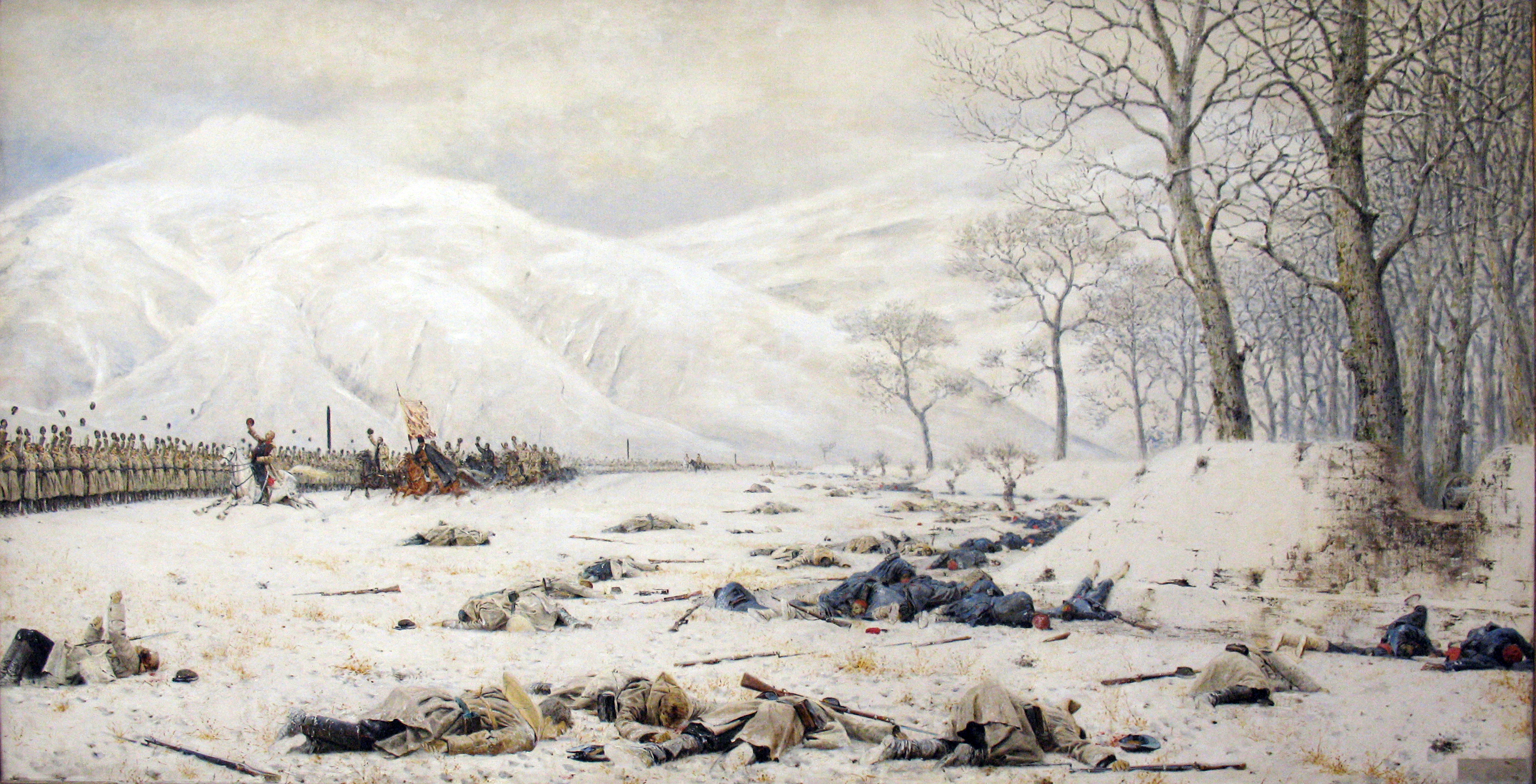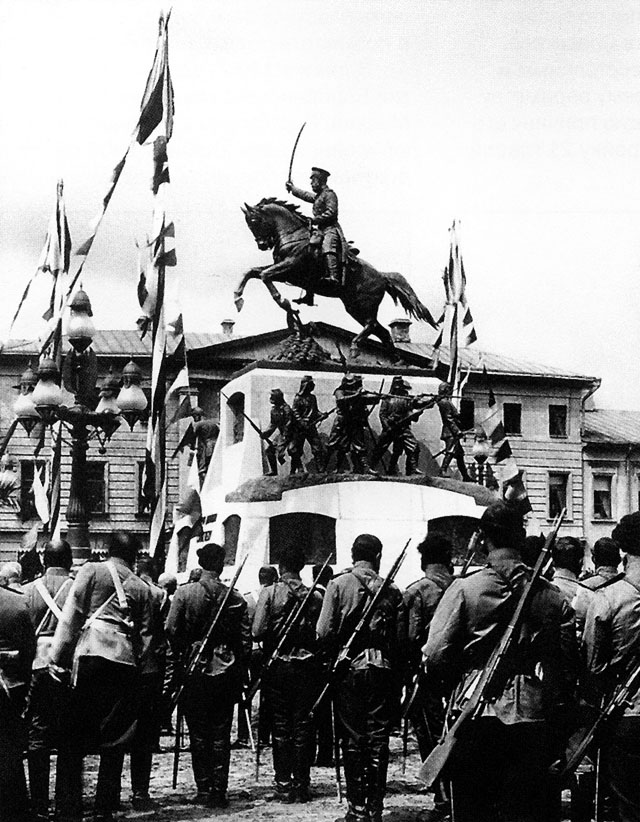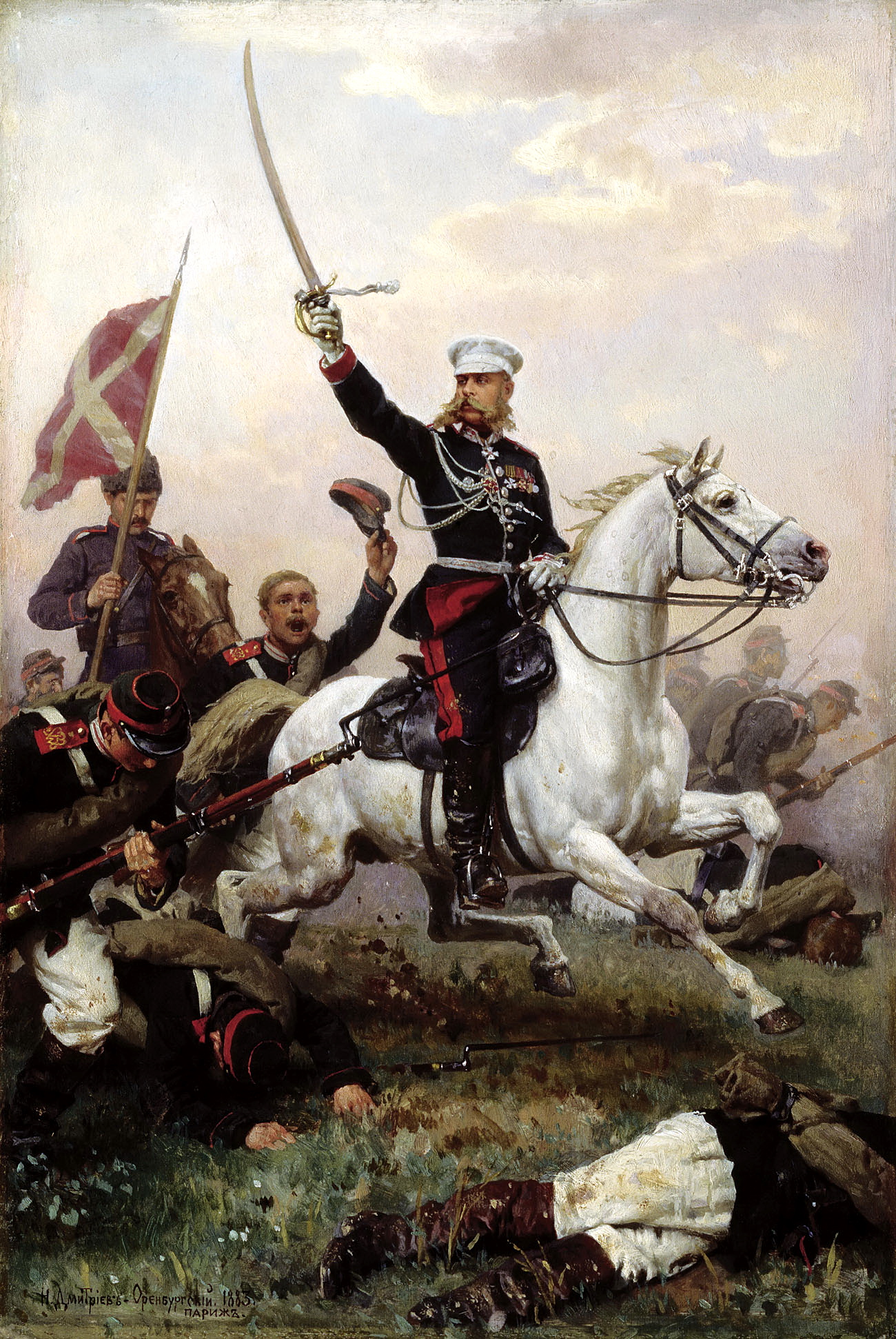General Skobelev (Dimitriev-Orenburgsky).jpg on:
[Wikipedia]
[Google]
[Amazon]
Mikhail Dmitriyevich Skobelev (russian: Михаил Дмитриевич Скобелев; 29 September 1843 – 7 July 1882), a Russian general, became famous for his conquest of Central Asia and for his heroism during the Russo-Turkish War of 1877–1878. Dressed in a white uniform and mounted on a white horse, and always in the thickest of the fray, he was known and adored by his soldiers as the "White General" (and by the Turks as the "White Pasha"). During a campaign in
 He was promoted to major-general, decorated with the
He was promoted to major-general, decorated with the  Promoted to be a
Promoted to be a
 ;Russian
*
;Russian
*
Khiva
Khiva ( uz, Xiva/, خىۋا; fa, خیوه, ; alternative or historical names include ''Kheeva'', ''Khorasam'', ''Khoresm'', ''Khwarezm'', ''Khwarizm'', ''Khwarazm'', ''Chorezm'', ar, خوارزم and fa, خوارزم) is a district-level city ...
, his Turkmen opponents called him ''goz ganly'' or "Bloody Eyes".
British Field Marshal
Field marshal (or field-marshal, abbreviated as FM) is the most senior military rank, ordinarily senior to the general officer ranks. Usually, it is the highest rank in an army and as such few persons are appointed to it. It is considered as ...
Bernard Montgomery
Field Marshal Bernard Law Montgomery, 1st Viscount Montgomery of Alamein, (; 17 November 1887 – 24 March 1976), nicknamed "Monty", was a senior British Army officer who served in the First World War, the Irish War of Independence and t ...
assessed Skobelev as the world's "ablest single commander" between 1870 and 1914 and wrote of his "skilful and inspiring" leadership.
Francis Vinton Greene
Francis Vinton Greene (June 27, 1850 – May 13, 1921) was a United States Army officer who fought in the Spanish–American War. He came from the Greene family of Rhode Island, noted for its long line of participants in American military history ...
also rated Skobelev highly.
Early life and Conquest of Khiva
Skobelev was born in Saint Petersburg on 29 September 1843. His mother was Russian philanthropist Olga Skobeleva, and his father was Russian generalDmitry Ivanovich Skobelev
Dmitri (russian: Дми́трий); Church Slavic form: Dimitry or Dimitri (); ancient Russian forms: D'mitriy or Dmitr ( or ) is a male given name common in Orthodox Christian culture, the Russian version of Greek Demetrios (Δημήτριος ...
. After graduating from the General Staff Academy as a staff officer, he was sent to Turkestan in 1868 and, with the exception of an interval of two years, during which he was on the staff of the grand duke Michael in the Caucasus, remained in Central Asia until 1877.
During the Khivan campaign of 1873
In the Russo–Khivan War of 1873, Russia conquered the Khanate of Khiva, and it became a Russian protectorate.
Background
Twice before, Russia had failed to subjugate Khiva. In 1717, Prince Bekovitch-Cherkassky marched from the Caspian and fou ...
he commanded the advanced guard of General Lomakin's column from Kinderly Bay, in the Caspian Sea, to join General Verevkin, from Orenburg
Orenburg (russian: Оренбу́рг, ), formerly known as Chkalov (1938–1957), is the administrative center of Orenburg Oblast, Russia. It lies on the Ural River, southeast of Moscow. Orenburg is also very close to the Kazakhstan-Russia bor ...
, in the expedition to the Khanate of Khiva
The Khanate of Khiva ( chg, ''Khivâ Khânligi'', fa, ''Khânât-e Khiveh'', uz, Xiva xonligi, tk, Hywa hanlygy) was a Central Asian polity that existed in the historical region of Khwarezm in Central Asia from 1511 to 1920, except fo ...
, and, after great suffering on the desert march, took a prominent part in the capture of the Khivan capital. Later, dressed as a Turkoman, he intrepidly explored in a hostile country the route from Khiva to Igdy on the old riverbed of the Oxus. In 1875, he was given an important command in the expedition against the Khanate of Kokand under General Konstantin Petrovich von Kaufman, showing great capacity in the action of Makram, where he outmanoeuvered a greatly superior force and captured 58 guns, and in a brilliant night attack during the retreat from Andijan, when he routed a large force with a handful of cavalry.
Later life, the Battle of Pleven, Geok Tepe and Death
Order of St George
The Order of Saint George (russian: Орден Святого Георгия, Orden Svyatogo Georgiya) is the highest military decoration of the Russian Federation. Originally established on 26 November 1769 Julian (7 December 1769 Gregorian) a ...
, and appointed the first governor of the Ferghana
Fergana ( uz, Fargʻona/Фарғона, ), or Ferghana, is a district-level city and the capital of Fergana Region in eastern Uzbekistan. Fergana is about 420 km east of Tashkent, about 75 km west of Andijan, and less than 20 km fr ...
Oblast. In the Turkish War of 1877 he seized the bridge over the Siret at Barboşi (nowadays a neighborhood of Galaţi, where the Siret flows into the Danube) in April; in June they crossed the Danube with the 8th corps. Skobelev commanded the Caucasian Cossack
The Cossacks , es, cosaco , et, Kasakad, cazacii , fi, Kasakat, cazacii , french: cosaques , hu, kozákok, cazacii , it, cosacchi , orv, коза́ки, pl, Kozacy , pt, cossacos , ro, cazaci , russian: казаки́ or ...
Brigade in the attack of the Green Hills at the second battle of Pleven. An infantry division under Skobelev's command assailed the Grivitsa redoubt to the north. Schakofsky managed to take two redoubts, but by the end of the day the Ottoman forces succeeded in repulsing all the attacks and retaking lost ground. Russian losses amounted to 7,300, and the Ottomans' to 2,000.
At the captured Lovetch on 3 September, the general distinguished himself again in desperate fighting on the Green Hills during the third battle of Pleven in which Skobelev took two southern redoubts. The Romanian 4th division led by General George Manu took the Grivitsa redoubt after four bloody assaults, personally assisted by Prince Carol. The next day the Turks retook the southern redoubts, but could not dislodge the Romanians, who repelled three counterattacks. From the beginning of September, Russian losses had amounted to roughly 20,000, while the Ottomans lost 5,000.
 Promoted to be a
Promoted to be a lieutenant-general
Lieutenant general (Lt Gen, LTG and similar) is a three-star military rank (NATO code OF-8) used in many countries. The rank traces its origins to the Middle Ages, where the title of lieutenant general was held by the second-in-command on the ...
, and given the command of the 16th Division, he took part in the investment of Pleven and also in the fight of 9 December, when Osman Pasha surrendered, with his army. In January 1878 he crossed the Balkans in a severe snowstorm defeating the Turks at Sheynovo, near Shipka Shipka may refer to:
* Shipka Monument, in Bulgaria
* Shipka (town), in Bulgaria
* Shipka Pass, in Bulgaria
* Shipka (stadium), in Asenovgrad, Bulgaria
* Shipka Saddle, in the Tangra Mountains, Livingston Island, Antarctica
* Shipka Valley, in the T ...
capturing 36,000 men and 90 guns.
Skobelev returned to Turkestan after the war, and in 1880 and 1881 further distinguished himself by retrieving the disasters inflicted by the Tekke Turkomans: following the Siege of Geoktepe
The Battle of Geok Tepe in 1881 was the main event in the 1880/81 Russian campaign to conquer the Teke Turkomans. Its effect was to give the Russian Empire control over most of what is now Turkmenistan, thereby nearly completing the Russian c ...
, it was stormed, the general captured the fort. Around 8,000 Turkmen soldiers and civilians, including women and children were slaughtered in a bloodbath in their flight, along with an additional 6,500 who died inside the fortress. The Russians massacre included all Turkmen males in the fortress who had not escaped, but they spared some 5,000 women and children and freed 600 Persian slaves. The defeat at Geok Tepe and the following slaughter broke the Turkmen resistance and decided the fate of Transcaspia, which was annexed to the Russian Empire. The great slaughter proved too much to stomach reducing the Akhal-Tekke country to submission. Skobelev was removed from his command because of the massacre. He was advancing on Ashkhabad
Ashgabat or Asgabat ( tk, Aşgabat, ; fa, عشقآباد, translit='Ešqābād, formerly named Poltoratsk ( rus, Полтора́цк, p=pəltɐˈratsk) between 1919 and 1927), is the capital and the largest city of Turkmenistan. It lies ...
and Kalat i-Nadiri when he was disavowed and recalled to Moscow. He was given the command at Minsk. The official reason for his transfer to Europe was to appease European public opinion over the slaughter at Geok Tepe. Some have suggested that he was suffering from delusions of grandeur and showing signs of political ambition.
In the last years of his life, Skobelev engaged actively in politics, supporting the ideas of Russian nationalism and militant Pan-Slavism. He has also been credited as one of the earliest promoters of the concept "Russia for Russians
"Russia for Russians" (russian: Росси́я для ру́сских, ''Rossiya dlya russkikh'', ) is a political slogan and nationalist doctrine, encapsulating the range of ideas from bestowing the ethnic white Russians with exclusive rights in ...
". At the beginning of 1882, he made speeches in Paris and in Moscow, predicting a desperate strife between Slavs and Germans. He was at once recalled to St Petersburg. He was staying at the Hôtel Dusseaux in Moscow and on his way to his estate in the country when he died suddenly of a heart attack on 7 July 1882. In Russia he was a very popular man at the time of his death, and not surprisingly, his death aroused suspicion among many. After all, he was a relatively young (38) and vigorous man. Skobelev's early death deprived Russia of a great military leader. This became especially evident during the Russo-Japanese War of 1904–05. The Russian generals commanding in that war were men of Skobelev's generation, but none of them had his military genius or charisma.
Skobelev In Memoriam
After Skobelev's death, in Moscow a monument was raised in his honour on a major square on Tverskaya Street (across from the city hall, where today stands the statue of Yuri Dolgorukiy, the founder of Moscow), which was given his name, and the town ofFergana
Fergana ( uz, Fargʻona/Фарғона, ), or Ferghana, is a district-level city and the capital of Fergana Region in eastern Uzbekistan. Fergana is about 420 km east of Tashkent, about 75 km west of Andijan, and less than 20 km fr ...
in Uzbekistan was renamed Skobelev.
Today, his name still lives, even beyond the Russian Federation: shortly after the end of the Turkish War of 1877, the Bulgarians constructed a park in Pleven
Pleven ( bg, Плèвен ) is the seventh most populous city in Bulgaria. Located in the northern part of the country, it is the administrative centre of Pleven Province, as well as of the subordinate Pleven municipality. It is the biggest ...
, Skobelev Park
Skobelev Park (Скобелев парк) is a museum park in the vicinity of Pleven, Bulgaria. It was built between 1904 and 1907 on the very battlefield of the Siege of Plevna during the Russo-Turkish War of 1877-78, specifically the third assau ...
, on one of the hills where the major battles for the city took place. The park is also a location of the Panorama Pleven's Epopee 1877
Pleven Epopee 1877, more commonly known as Pleven Panorama, is a panorama located in Pleven, Bulgaria, that depicts the events of the Russian-Turkish War of 1877–78, specifically the five-month Siege of Plevna (Pleven Epopee) which made the ...
memorial, where in one of the scenes of the gigantic 360 degree panoramic painting
Panoramic paintings are massive artworks that reveal a wide, all-encompassing view of a particular subject, often a landscape, military battle, or historical event. They became especially popular in the 19th century in Europe and the United St ...
the White General is displayed charging with his horse and bare sword, leading the infantry Russian attack on the Turkish positions. A central boulevard in Sofia, the capital city of Bulgaria, also bears Mikhail Dmitriyevich Skobelev's name.
Shortly after the entrance of the park, the bust of the famous general can be seen, watching over the city. The park contains memorials with the names of the Russian and Romanian soldiers that died for the liberation of Pleven
Pleven ( bg, Плèвен ) is the seventh most populous city in Bulgaria. Located in the northern part of the country, it is the administrative centre of Pleven Province, as well as of the subordinate Pleven municipality. It is the biggest ...
, and is decorated with non-functional arms donated by Russia: cannons, cannonballs, gatling guns, rifles, and bayonets.
Honours and awards
 ;Russian
*
;Russian
* Order of St. Stanislaus
The Order of Saint Stanislaus ( pl, Order Św. Stanisława Biskupa Męczennika, russian: Орден Святого Станислава), also spelled Stanislas, was a Polish order of knighthood founded in 1765 by King Stanisław August Poni ...
, 1st class with swords
* Order of St. Anna
The Imperial Order of Saint Anna (russian: Орден Святой Анны; also "Order of Saint Anne" or "Order of Saint Ann") was a Holstein ducal and then Russian imperial order of chivalry. It was established by Karl Friedrich, Duke of Holst ...
. 1st and 4th classes
* Order of St. George, 2nd, 3rd and 4th classes
* Order of St. Vladimir
The Imperial Order of Saint Prince Vladimir (russian: орден Святого Владимира) was an Imperial Russian order established on by Empress Catherine II in memory of the deeds of Saint Vladimir, the Grand Prince and the Baptizer ...
, 3rd class with swords
* Gold Sword for Bravery
* Gold Sword for Bravery with diamonds
* Gold Sword for Bravery with diamonds for the transition of the Balkans
;Foreign
* Order of the Red Eagle, 1st and 2nd class with swords (Prussia)
* Pour le Mérite (Prussia)
* Grand Cross of the Order of the Cross of Takovo
The Order of the Cross of Takovo was a Serbian state order.
History
It was instituted in the Principality of Serbia in 1865 to mark the 50th anniversary of the Second Serbian Uprising against the Ottoman Empire, which had started in Takovo, Serbi ...
(Serbia)
* Order of the Cross of Takovo with swords (Serbia)
* Serbian Gold Medal for bravery;
* Montenegrin Medal
Montenegrin may refer to:
* Adjective for anything related to Montenegro
* Demonym referring to the people of Montenegro, see Demographics of Montenegro
* Ethnonym, referring to Montenegrins (ethnic group), Montenegrins, the ethnic group associat ...
* Romanian medal for military valour
Notes
References
* * {{DEFAULTSORT:Skobelev, Mikhail Dmitrievich 1843 births 1882 deaths Military personnel from Saint Petersburg People from Saint Petersburg Governorate Imperial Russian Army generals Russian military personnel of the Russo-Turkish War (1877–1878) Russian people of the January Uprising Recipients of the Order of Saint Stanislaus (Russian), 1st class Recipients of the Order of St. Vladimir, 3rd class Recipients of the Order of St. George of the Second Degree Recipients of the Order of St. George of the Third Degree Recipients of the Order of St. Anna, 1st class Recipients of the Medal for Bravery (Serbia) Recipients of the Gold Sword for Bravery Recipients of the Pour le Mérite (military class) Recipients of the Order of the Cross of Takovo Russian nationalists The Great Game